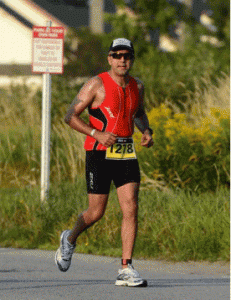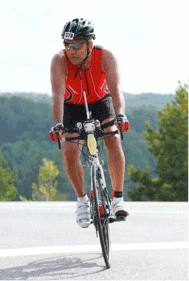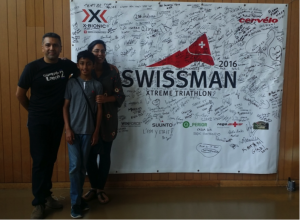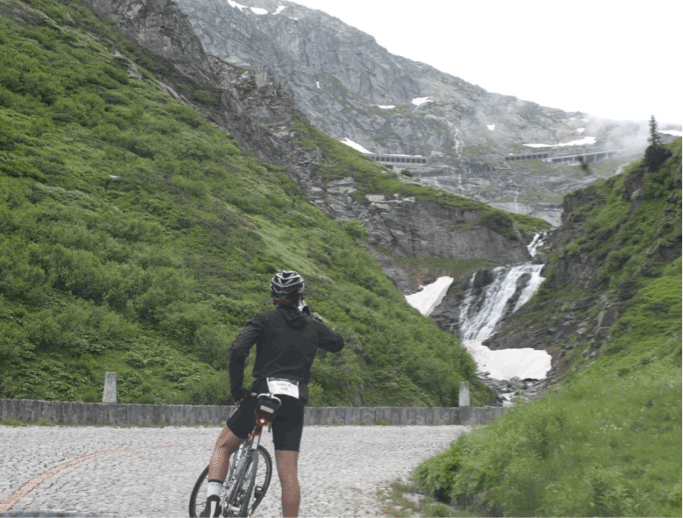Man of Steel
“From my perspective, there is nothing that cannot be achieved,” says Ghalib Salam. Coming from him the words resonate strongly, seeing as he has achieved the seemingly impossible, a super human feat fit for the gods of ancient legend. Ghalib completed the grueling Iron Man triathalon, held in August 2015 in Muskoka Canada to win the coveted Iron Man title that garners respect amongst athletes everywhere. The ultimate triathalon, it involves a 3.8 km swim followed by a 180 km bicycle ride capped off with a 42.2 km run to the finish line, all to be done in a maximum time of 17 hours.
Muskoka is one of the more challenging Ironman courses since it traverses hilly terrain. Ghalib completed the event in a little over 13 hours, which he feels was respectable but not spectacular. Two months earlier in May 2015, Khurram Khan also won the Ironman title in Texas. In a strange coincidence, two athletes of Pakistani origin completed the course just a few months apart becoming the first and second to ever do so. Since his formative years were spent in Pakistan, Ghalib, in fact, entered the race as a Pakistani national.
Born and educated in Lahore and later Karachi, he moved to Toronto about 11 years ago where he is a banker. Ghalib’s wife and 3 children are his staunch support system, accompanying him on events to help and cheer him on.
Earlier this year, Ghalib decided to tackle the Swiss version of the Ironman, Swissman, which is even more arduous since it involves running and cycling in the Alps. In fact, it is ranked amongst the world’s top ten toughest endurance challenges. Unfortunately, however, about three-quarters of the way through he had to abandon the event. “I wasn’t acclimatized to the Alps and the extreme changes in altitude and the incline proved very difficult.” To top it all, he got caught in a thunder storm. “In such a situation we are supposed to take cover but since I was cycling at that point and had nowhere to take shelter, I kept going. However, the temperature suddenly dropped and the wind was so strong that I got thrown off my bike, once, twice…the third time I decided to pull out and be better prepared the next time.”
“But the experience was invaluable,” says Ghalib who also says he cherished the opportunity to interact with some very high performing athletes “They gave me some very useful tips before the event and were very generous with their knowledge.”
Ghalib got involved with marathons in Canada when he first joined a run as a fundraiser for The Citizens Foundation. From those five and ten kilometer runs, he quickly went on to tougher ones. “This was the re-activation of my sporting activites, “ says Ghalib who was a national junior swimming champion as a teenager and held four swimming records in Pakistan. “My love of running had been re-ignited but I was getting a bit bored. Then my neighbor suggested I try triathlons. The idea really appealed to me …the concept of touching water, then cycling, then the run. “ He started off with the less intense triathalons, going for a more rigorous one every year. “I was gaining in strength and stamina and confidence. “ Finally, four years later, he felt ready to take on the Ironman.
 The journey took, time, patience and rigid discipline. “I read a lot on-line, found books on how to train oneself mentally as well as physically. I read books on psychology, how to build mental endurance, on nutrition, technique. “ Throughout this process Ghalib has never had a formal trainer, relying instead on his own rigid work ethic and intuition. “I prepared myself through a process of trial and error and in fact, this built greater confidence within myself.”
The journey took, time, patience and rigid discipline. “I read a lot on-line, found books on how to train oneself mentally as well as physically. I read books on psychology, how to build mental endurance, on nutrition, technique. “ Throughout this process Ghalib has never had a formal trainer, relying instead on his own rigid work ethic and intuition. “I prepared myself through a process of trial and error and in fact, this built greater confidence within myself.”
Athletes stop training for this epic event a full 2 weeks earlier, resting and conserving energy for the Herculean endeavor ahead.
 Naturally a good swimmer, for Ghalib the most challenging discipline of the event is cycling. “ That’s where the real meat is. It takes lots of endurance and complete focus. There are turns, potholes, if you lose your connectivity, bad things will happen.” Cycling in the Alps was especially challenging since cycling downhill, one can hit speeds of 80km an hour. “And there are no railings along those mountain roads,” Ghalib points out. “You really learn to respect the terrain. One of the athlete’s advised me to ‘respect the mountains.’ And that really stuck with me.”
Naturally a good swimmer, for Ghalib the most challenging discipline of the event is cycling. “ That’s where the real meat is. It takes lots of endurance and complete focus. There are turns, potholes, if you lose your connectivity, bad things will happen.” Cycling in the Alps was especially challenging since cycling downhill, one can hit speeds of 80km an hour. “And there are no railings along those mountain roads,” Ghalib points out. “You really learn to respect the terrain. One of the athlete’s advised me to ‘respect the mountains.’ And that really stuck with me.”
 Pushing oneself to the limit for hours at a stretch, battling the elements and fatigue, what goes through the mind of a triathelete? “Your mind is constantly talking to your body,” explains Ghalib. “You have to keep reminding it of the goal, reinforcing strategy, focusing on how to use your energy efficiently. You also get energy from the other athletes around you. “
Pushing oneself to the limit for hours at a stretch, battling the elements and fatigue, what goes through the mind of a triathelete? “Your mind is constantly talking to your body,” explains Ghalib. “You have to keep reminding it of the goal, reinforcing strategy, focusing on how to use your energy efficiently. You also get energy from the other athletes around you. “
Needless to say, Ironman is a life-altering event for those who undertake it. ” The experience has changed me tremendously,” says Ghalib who has been invited to speak about his journey to the Pakistani community in Toronto. “I have learnt to give a very high level of commitment to whatever I undertake. I’ve learnt how to raise the bar and keep pushing. He talks about building strength and how to convert even negative energy to positive. “If you’re scared or tense convert it into a motivating force,“ he insists. “And as you continue to remain focused, you can change your trajectory and move it upwards… in life, in work and in your relationships.”
Zahra Chughtai has worked and written for Pakistan's leading publications including Newsline, the Herald and Dawn. She continues to write freelance.





